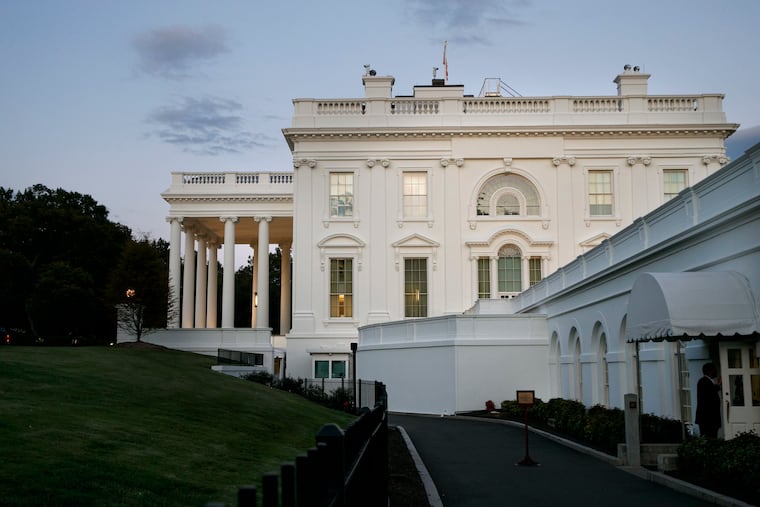Trump says he canceled secret Camp David talks with the Taliban
The sudden demise of the talks may doom direct U.S. negotiations with the Taliban that held out the prospect of ending 18 years of combat in Afghanistan, making it America’s longest-running war.

President Donald Trump said Saturday that he canceled a secret meeting with major Taliban leaders and the president of Afghanistan, set for Sunday at Camp David, and discontinued peace negotiations after a U.S. soldier was killed.
The sudden demise of the talks may doom direct U.S. negotiations with the Taliban that held out the prospect of ending 18 years of combat in Afghanistan, making it America’s longest-running war. The planned meeting revealed by Trump on Saturday had been a closely held secret.
The president had grown frustrated with the peace negotiations that his national security adviser, John Bolton, thought were inadequate and sought to quash, according to a person familiar with the matter. Trump tried to resolve the matter personally by inviting the Taliban and Ghani for talks with him, the person said.
But Trump said in a series of three Twitter messages that he called off the previously unreported talks at the presidential retreat because they “probably don’t have the power to negotiate a meaningful agreement anyway.”
The Taliban admitted to an attack in Kabul that killed 12 people — including an American soldier — in order to “build false leverage,” Trump said in a tweet. “What kind of people would kill so many in order to seemingly strengthen their bargaining position?”
The U.S. has been fighting in Afghanistan since 2001, soon after the Sept. 11 terrorist attacks. The talks would have occurred days before the 18th anniversary of the attacks that killed almost 3,000 people and prompted the U.S. invasion of Afghanistan.
On Thursday, a U.S. soldier and Romanian service members were killed when a Taliban car bomb exploded near the U.S. embassy in Kabul. It was the second major attack there this week, even as the protagonists were nearing a peace deal that’s been months in the making.
At the time, Afghan President Ashraf Ghani decried the attack in the “strongest terms,” saying that making peace with Taliban militants who are still killing “innocent people will be pointless,” according to an emailed statement.
U.S. Special Representative for Afghanistan Reconciliation Zalmay Khalilzad said in a tweet days ago that “we are at the threshold of an agreement that will reduce violence and open the door for Afghans to sit together to negotiate an honorable & sustainable peace and a unified, sovereign Afghanistan that does not threaten the United States, its allies, or any other country.”
But Bolton led opposition, contending that Khalilzad was accepting terms from the Taliban that were too vague.
The U.S. has insisted that no deal would be final until the Taliban reached an accord with Ghani, direct talks that the Taliban long refused to undertake. Trump’s tweet indicated that the Camp David meeting was to be an effort to bridge that divide by having him meet separately with Ghani and the Taliban.
The State Department referred inquiries about Trump’s Camp David meeting — including who was scheduled to attend — to the White House, where officials declined to comment.
Secretary of State Michael Pompeo has scheduled appearances on five political talk shows on Sunday. The path to a peace agreement had been expected to be a major theme he’d advance in the interviews.
Trump promised during the 2016 campaign to bring home American troops from overseas conflicts, and conclude what he called endless wars.
The Americans have been negotiating directly with Taliban forces in an effort to deliver on the troop withdrawal pledge. Afghan authorities have been largely sidelined in the process, even as the Taliban have escalated attacks.
The U.S. has proposed tying troop withdrawals to a pledge by the Taliban to prohibit terrorist groups like Islamic State and al-Qaeda from using Afghanistan to stage assaults.
U.S. negotiations with the Taliban would be considered successful if they led to less violence by the insurgent group, and promoted peaceful dialogue among Afghans, the outgoing chairman of the Joint Chiefs of Staff, Joseph Dunford, said on Thursday.
—With assistance from Eltaf Najafizada, Glen Carey, Hailey Waller and Alyza Sebenius.
To contact the reporters on this story: Jennifer Jacobs in Washington at jjacobs68@bloomberg.net;Nick Wadhams in Washington at nwadhams@bloomberg.net
To contact the editors responsible for this story: James Ludden at jludden@bloomberg.net, Justin Blum, Larry Liebert
©2019 Bloomberg L.P.